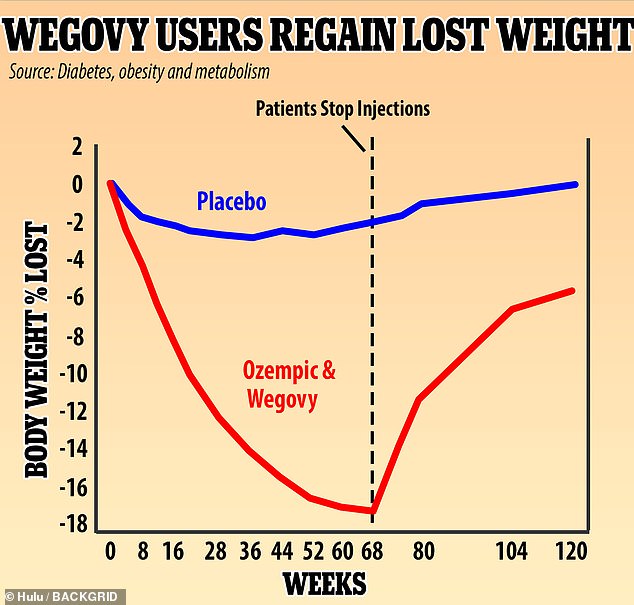Fat cells can ‘remember’ that they are overweight and make it more difficult to lose pounds
Weight loss medications have taken the world by storm, but recent studies have shown that even these miracle workers have one fatal flaw: people often return to their original weight after taking them.
This includes people like Artemis Bayandor, 41, a flight attendant from Illinois, who used Ozempic to lose 15 pounds. After stopping the drug because of the cost, Bayanador regained his weight, adding an additional 16 pounds.
According to a new study, if you’re like Bayanador and the numbers on your scale keep rising after you lose weight, biology may be to blame.
Researchers from Switzerland discovered that fat cells in the body have a ‘memory’ that tells them to keep growing even after they have lost weight.
The team used fat cells from obese people and healthy weight people to see if there were differences in their genes that could control their weight gain.
They found that obese people had permanent changes in their DNA that affected the way their cells use and store energy, even after they lost weight.
These genes made their metabolism less active, making it harder to process food without gaining weight.
This could explain why some people struggle to maintain their weight after going on a diet, said the study’s lead author, Professor Ferdinand Von Meyenn from ETH Zurich.

Artemis Bayandor, 41, from Illinois, says she is now about 20 pounds heavier than before she started using Wegovy. She lost 15 pounds while taking the drug for six months, but quickly regained all the weight and extra weight

Research from Stanford shows that between 80 and 85 percent of people have difficulty keeping their weight off after losing a significant amount
Professor Von Meyenn told Bloomberg: ‘This isn’t just a lack of willingness or a lack of willpower, there really is a molecular mechanism that is fighting against this weight loss.’
Between 80 and 85 percent of people who lose a significant amount of weight later gain it back, according to research Stanford Medicine. Sometimes this is because people return to old habits, but sometimes the pounds pile up again, seemingly for no reason.
This mystery motivated the Swiss researchers to look at genes, and their results were published in the magazine Nature.
Genes are the instructions that dictate every part of our biology, but they can be affected by small chemical changes called epigenetic changes.
Epigenetics is the way behavior and environment can cause changes in DNA. These changes are reversible, unlike genetic changes, which permanently alter the DNA.
They can be caused by things like exposure to air pollution, childhood dietary choices, substance use, and even trauma early in life. according to Cleveland Clinic.
Research has shown that these epigenetic changes are linked to cancer, substance use disorders, dementia and aging.
Prof. Von Meyenn and his colleagues wanted to look at the epigenetics of people with weight fluctuations and see if it differed from those who were at a consistent, lean weight.
They took samples of fat tissue from 10 lean people and 13 obese people.
They also took samples from overweight mice and compared them with samples from healthy weight mice.
They then studied the fat tissue of the people who were struggling with their weight and found that they showed consistent epigenetic changes in the parts of their genes that control energy.
These changes suppressed metabolism, making it more difficult to maintain weight.
This suggests that even after losing weight, these cells ‘remember’ their older state and are likely to return to their previous patterns.
Prof. Von Meyeenn told Bloomberg explained that this may happen because the cells became accustomed to the patterns of processing food and storing fat that were necessary in an obese body.

An older British study found that people taking Wegovy experienced rapid weight loss, losing 18 percent of their weight in 68 weeks. They regained two-thirds of that weight, or 12 percent of their original body weight, in the year after they stopped the weekly injections
Just because someone loses weight doesn’t necessarily mean that those cells, which are programmed by their environment to act one way, will change, he said.
So if you can prevent yourself from becoming obese in the first place, your cells won’t be trained to return to that state, he suggested.
Prof. Von Meyeen said, “If you have never been obese, you will never be exposed to that memory and never have the problem of regaining the weight.”
A recent study found that the power of these epigenetic pulls to gain weight may be even greater than the dramatic changes associated with taking appetite control medications such as Ozempic or Wegovy.
Scientifically known as GLP-1 receptor agonists, these drugs mimic signals in the body that tell your brain when you feel full and control the speed at which food moves through your gastrointestinal tract.
Researchers at Northwestern University found that the majority of patients who took one of these drugs to lose weight regained two-thirds of the weight they had lost.
This is concerning given the number of people who start taking the drug and choose to stop taking it, the scientists said.
About 85 percent of people who use these types of medications stop taking them within two years. To overcome the yo-yo, doctors suggest that a GLP-1 user should continue taking the medication for life.
